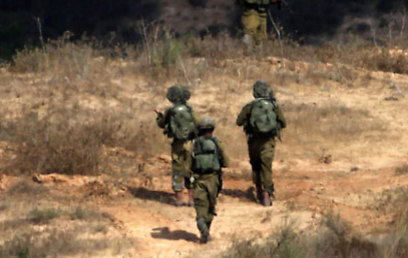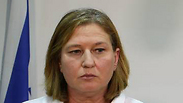They often mention in their wills where or who they want the money to go to – to lone soldiers, for example, to soldiers from families in distress, to disabled IDF veterans or to a certain military unit – and for what purpose – for rehabilitating wounded soldiers or for training sniffer dogs or for purchasing equipment for times of emergency, etc.
Justice Minister Tzipi Livni sent a scathing letter last week to Defense Minister Moshe Ya'alon, claiming that the Defense Ministry was violating the deceased donors' desires, failing to implement their wills or spending the money on other purposes.
We are talking about tens of millions of shekels here. If we take into consideration that this problem has been going on for years, we are actually talking about hundreds of millions of shekels.

Livni's letter was sent at a particularly sensitive timing, after soldiers who participated in Operation Protective Edge complained that their families were suffering from poverty and had even been reduced to hunger. They said the army had failed to find the required amount of money to help them.
The Administrator General's Office, which operates as part of the Justice Ministry, handled estates donated to the State of Israel. The ministry also includes a public committee which decides where the funds donated to the state should go to and ensures that the ministries make proper use of the money, according to the donor's will.
In her current term, Livni has made changes in the committee in a bid to direct more funds to social purposes.
The committee also supervises the distribution of the money in the defense establishment. "Any delay in fulfilling the desires of the will's writer is inappropriate," Livni wrote. "In an inquiry I conducted in recent days, I learned that there are fundamental failures in the Defense Ministry's conduct."
Livni elaborates:
- The Administrator General's Office holds tens of millions of shekels from estates left for security purposes, which the Defense Ministry has failed to properly implement. In 2007, for example, the committee approved NIS 4 million (about $1 million) for the expansion of a head injury rehabilitation center. The Defense Ministry failed to use the money, and the approval expired in 2011. In 2009, the committee approved NIS 23.5 million ($6.3 million) for the establishment of a rehabilitation facility for soldiers in southern Israel. That sum was not used either.
From 2010 to 2013, the Administrator General's Office accumulated some NIS 32 million ($8.6 million) from estates left for security purposes. The Defense Ministry did not file a request to make use of these funds, which should have been used for treating soldiers wounded in action, for purchasing equipment for disabled IDF veterans and for fighters' welfare.
- Other government ministries have recommended handing inheritance funds to associations from the voluntary sector. Although some of these funds can be implemented through associations which work for the soldiers' welfare and which commemorate fallen soldiers, and although these issues are handled by other authorities in Israel as well, the Defense Ministry is insisting on keeping all the money in foundations operating under its authority.
When the Kfir Brigade Fighters association, for example, asked to receive inheritance funds it was turned down. So was the Sha'ar Hanegev Regional Council, which sought to use the money to purchase emergency equipment.
- The Defense Ministry has failed to provide the committee with an annual report about its use of the inheritance funds, and has failed to explain its refusal to do so. Livni notes that in 2009, it was discovered that hundreds of thousands of shekels from inheritance funds were spent on purchasing thousands of copies of a book, "in a complete deviation from the designated purposes of these funds.
"The Justice Ministry," Livni writes, "plans to reinforce its supervision on the implementation of the inheritance funds by the Defense Ministry and to increase the equal distribution of the estates for security purposes."
The Justice Ministry's investigation into the Defense Ministry's use of the inheritance funds has only begun. The ministry argues that for years, these funds have been used as a sort of secondary coffer for the Defense Ministry and have been handed out without any proper control and supervision.
The defense ministry's media advisor said in response that the letter had yet to reach Minister Ya'alon's desk, and that once he received Livni's appeal he would study it and handle it.

















